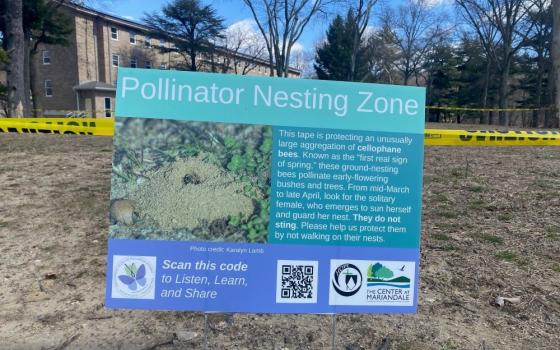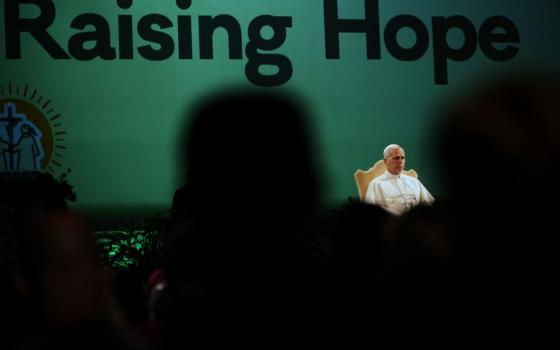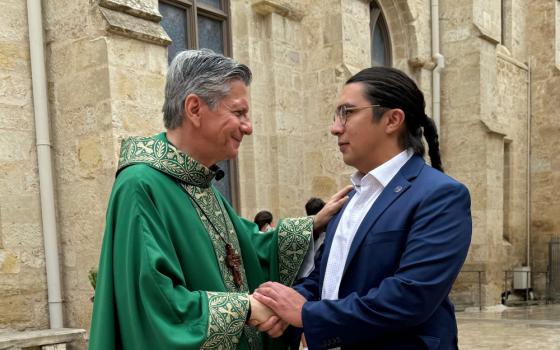Pope Leo XIV blesses a chunk of ice from a glacier in Greenland during the opening session of an international conference celebrating the 10th anniversary of Pope Francis' encyclical "Laudato Si', on Care for Our Common Home," at the Mariapolis Center in Castel Gandolfo, Italy, Oct. 1. The ice block was fished out of the Nuup Kangerlua fjord in Greenland after becoming detached from the ice sheet. (CNS/Vatican Media)
Standing with his hands extended over an ancient glacier fragment, Pope Leo XIV offered a blessing upon the estimated 20,000-year-old stone of ice from Greenland.
"Lord of Life, bless this water. May it awaken our hearts, cleanse our indifference, soothe our grief and renew our hope," the pope prayed over the slowly melting ice and water.
Two of his words — hearts and hope — resonated throughout the conference here marking the 10-year anniversary of Pope Francis' landmark encyclical, "Laudato Si', on Care for Our Common Home."
While the mention of hope came as little surprise at a conference titled "Raising Hope for Climate Justice," a persistent dialogue emerged Oct. 1-3 about a shift in approach for the next decade of how the Catholic Church might continue its response to Francis' landmark socio-environmental letter.
The heart, Leo said in his address to an audience of more than 1,000 people, was "the place where external reality has the greatest impact" and "where decisions are forged."
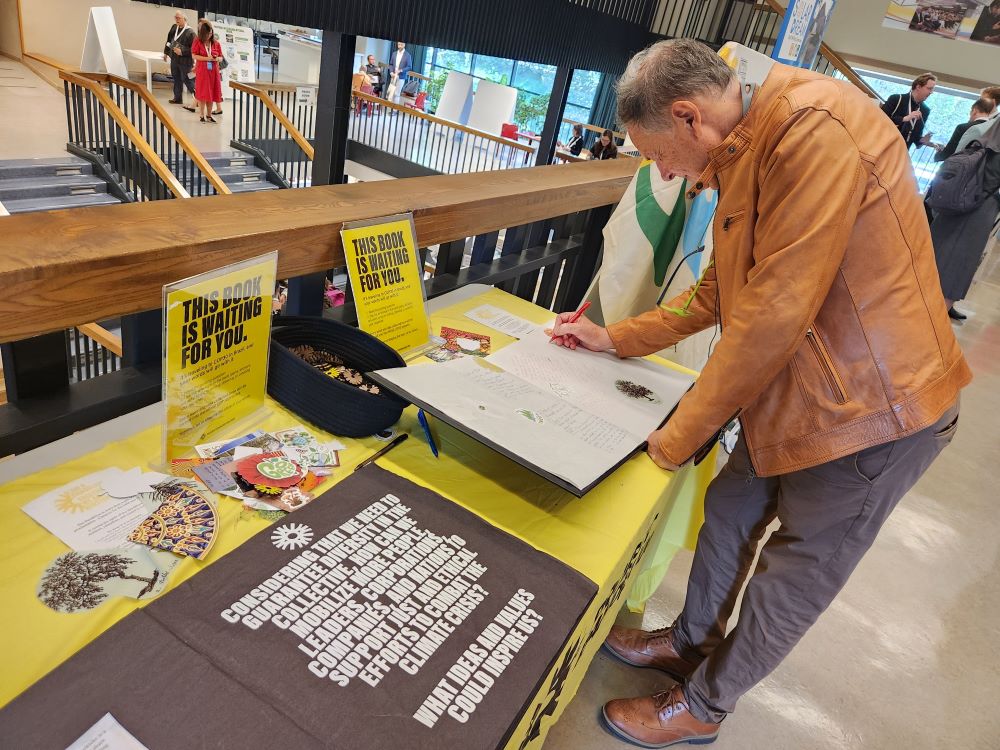
A man writes in a book collecting ideas on ways to act on climate change during the "Raising Hope for Climate Justice" conference marking the 10-year anniversary of Pope Francis' encyclical "Laudato Si', on Care for Our Common Home" on Oct. 1. (NCR photo/Brian Roewe)
"It is only by returning to the heart that a true ecological conversion can take place," he said. "We must shift from collecting data to caring; and from environmental discourse to an ecological conversion that transforms both personal and communal lifestyles."
Personal connections
Leo was not alone to propose a greater focus on the heart to sway more people, both inside and outside the church, in efforts to communicate and address climate change and other environmental challenges.
Speaker after speaker, including scientist Katharine Hayhoe, activist Bill McKibben, and actor and former politician Arnold Schwarzenegger, echoed the pope in saying the way to reach people on climate change may not be with facts and stories of devastation, but through personal connections.
'I'm convinced, and I know I'm not the only one, that if we take the Bible seriously, we will be at the front of the line demanding climate action.'
—Katharine Hayhoe
Changing the tide on climate change begins with changing the conversation, said Hayhoe, chief scientist for The Nature Conservancy and an evangelical Christian. That means less fear and more focus on both how rising temperatures will impact people's daily lives, especially people and places they care about and what real solutions look like.
"We begin these conversations not with the head, but with the heart," she said in a video message. "Because I'm convinced, and I know I'm not the only one, that if we take the Bible seriously, we will be at the front of the line demanding climate action."
A starting point to a new vocabulary on climate change is Laudato Si' itself, multiple speakers suggested. They pointed to its accessible language and praised how Francis' conveyed the seriousness of the issue while also calling people to action.
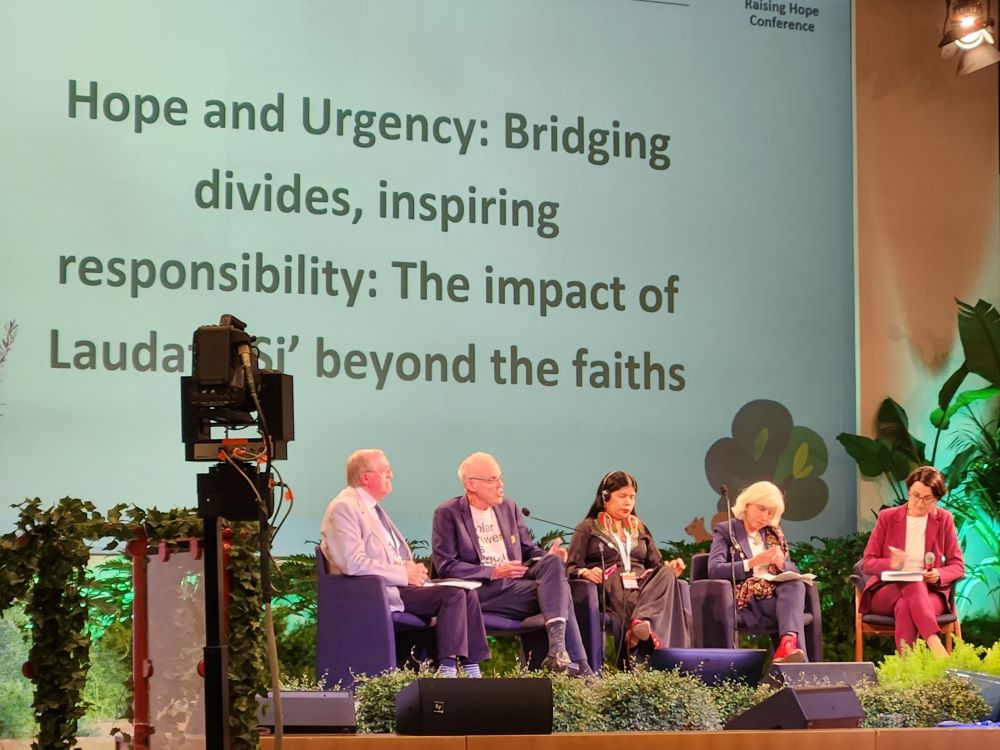
Climate activist and writer Bill McKibben, second from left, speaks during a panel discussion Oct. 2 at the "Raising Hope for Climate Justice" conference marking the 10-year anniversary of Pope Francis' encyclical "Laudato Si', on Care for Our Common Home." (NCR photo/Brian Roewe)
Demonstrating solutions in action, like the Vatican's planned 1,000-acre solar farm that is set to make the Holy See the first carbon-neutral state, can help build a more positive-toned movement for clean and affordable energy, McKibben said.
"In this current moment, the greatest inspiration from the church may be deeds and not words," he said.
'We do it together'
Yeb Sano, board director for the Laudato Si' Movement, which facilitated the gathering, told the crowd at the start that they gathered not just to mark the 10-year anniversary of Francis' encyclical, "but to answer a question that grows more urgent with every wildfire, with every flood, with every sunrise — that in the face of this deepening crisis, how do we dare raise hope?"
"Our answer is this: We do it together."
Columban Sr. Anne Carbon of the Philippines, who relished meeting with people in person she has known mostly through digital forums, appreciated the chance to be with those who shared her passion for doing something for the care of creation.
And while hope was in surplus, it didn't sidestep the dire realities facing the world around climate change and the environment. "Hope is our rallying cry. But we also must acknowledge that the planetary crisis is intensifying," said Christina Leaño, Laudato Si' Movement associate director.
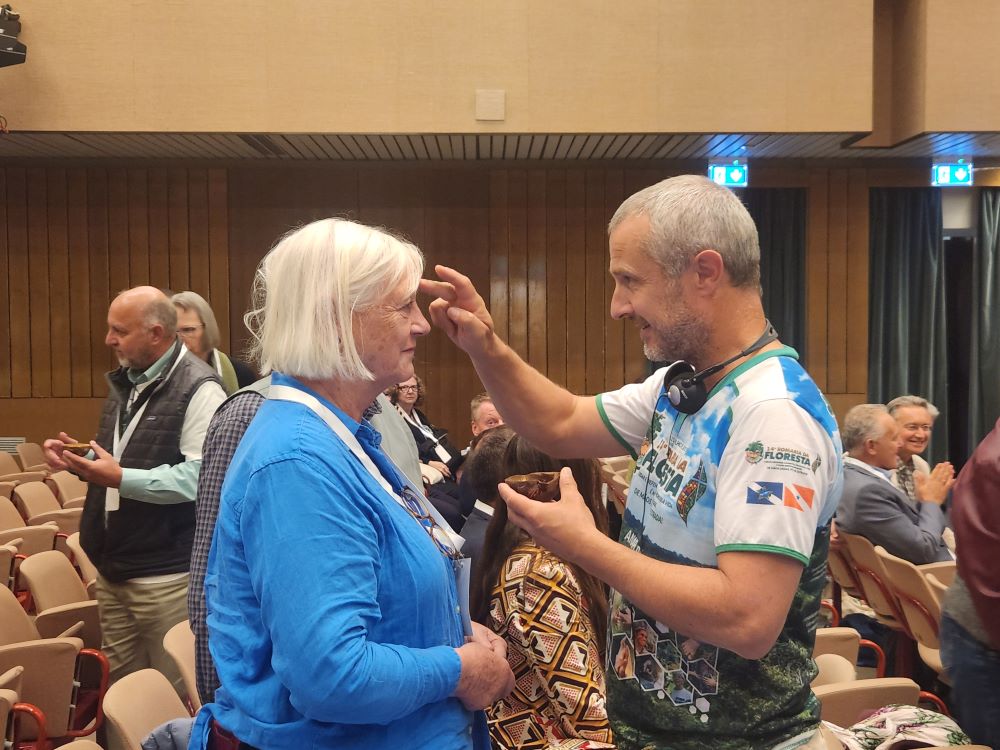
Attendees at the "Raising Hope for Climate Justice" conference offer one another blessings Oct. 3 with water from the 20,000-year-old Greenland glacier that Pope Leo XIV had blessed days earlier. (NCR photo/Brian Roewe)
The past 10 years all rank as the hottest on record. Nations have backslid on climate plans, with just 40 countries so far putting forward new emissions-reduction plans as required this year under the Paris Agreement. In the U.S., the Trump administration has waged an assault on climate science, policies and funding.
But those stark realities swayed few in attendance from their optimism.
"If ever there was a time we needed hope, not naive or passable, but courageous, disciplined and determined hope, it is now," said Kumi Naidoo, president of the Fossil Fuel Nonproliferation Treaty, an effort to adopt a global phaseout of the use of coal, oil and gas. "And hope, if it is to mean anything, must be wedded to urgency."
Reasons for hope were also on full display in panels and presentations.
Irish Bishop Martin Hayes shared how the bishops of the Emerald Isle made the decision to divest from fossil fuels as well as return at least 30% of church land to nature. Others talked about the growing adoption of solar power — farmers in Pakistan and across Africa adding panels to their fields and Ukrainians turning to solar power amid the ongoing war with Russia.
McKibben, author of the new book Here Comes the Sun: A Last Chance for the Climate and a Fresh Chance for Civilization, said the Vatican's planned solar array follows major advances for solar, now the cheapest form of energy generation, surpassing fossil fuels like coal and gas.
"We can replace energy from hell with energy from heaven," he said.
In Ethiopia, a joint collaboration between Caritas Ethiopia and Catholic development groups Catholic Relief Services (U.S.), Trocaire (Ireland), CAFOD (United Kingdom) and SCIAF (Scotland) transformed 13 barren valleys into flowing streams of water for communities to farm and feed their families.
"Slowly, year after year, the streams in those valleys came back," said Alistair Dutton, secretary general of Caritas, who worked on the project while with SCIAF. "And so today we have running rivers 12 months of the year, and they irrigate our fields that were not there for the last 30-plus years."
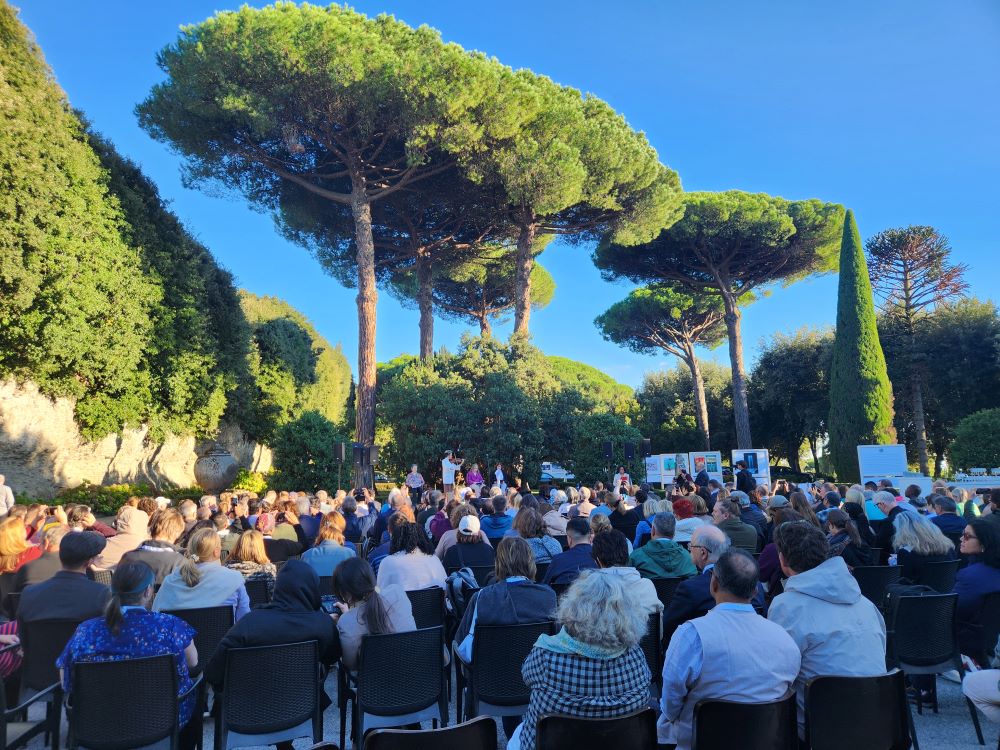
About 1,000 people attended the "Raising Hope for Climate Justice" conference in Castel Gandolfo, Italy, Oct. 1-3 marked the 10-year anniversary of Pope Francis' encyclical "Laudato Si', on Care for Our Common Home." (NCR photo/Brian Roewe)
Also highlighted was the formation of a multifaith alliance to support the proposed Fossil Fuel Nonproliferation Treaty. Numerous organizations also expressed interest in Caritas' ecological debt relief campaign for the Jubilee Year.
"I have seen people of different walks of life who have gathered here because they desire something better, not just for themselves, but for those who are most affected," said Missionary Sr. Maamalifar Poreku, co-executive secretary for the Justice, Peace and Integrity of Creation commission for the International Union of Superiors General and Union of Superiors General, the umbrella groups for leaders of the church's women and men religious orders.
Francis' presence
While Leo joined the conference on its first day, the spirit of Francis was ever present.
Speakers regularly referenced the Laudato Si' author and many spoke of him as a continuing source of inspiration, strength and resolve on environmental matters.
Advertisement
"Pope Francis' legacy is never-ending," said Daniela Alba, a staffer with the Jesuit social justice and ecology secretariat in Rome. "I think that we have so much to give him thanks because it's really hard sometimes for people to see intersectionality, especially with social justice, ecology and faith."
Near the conference's end, participants completed "people's determined commitments" — a nod to the emissions-reduction plans (formally, the "nationally determined commitments") that countries are expected to bring to COP30, the United Nations climate summit to be held in Belem, Brazil, in November.
The people's pledges will also head to COP30 with the large delegations of Catholics expected to attend. Less clear is whether Leo will accept one of the many invitations he received to attend, including one from Brazilian climate and environment minister Marina Silva.
"He was asked about 10 times [Wednesday] by different people. He didn't say no. He didn't say no and he didn't say yes," said Lorna Gold, Laudato Si' Movement executive director.
Even absent the pope, Gold challenged those at the Raising Hope conference who will head to Belem to bring not just their personal climate commitments but something rare within environmental movements: the spirit of hope and heart that they generated together during this week.
"We need to bring that joy to COP," she said.
The National Catholic Reporter's Rome Bureau is made possible in part by the generosity of Joan and Bob McGrath.





